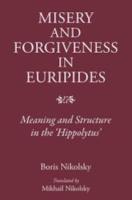
The Classical Press of Wales (2015) h/b 280pp £58 (ISBN 9781910589038)
This monograph on Euripides’ Hippolytus has seven dense chapters of analysis which make it a demanding read, one not for the fainthearted and certainly not for the general reader, but it is a thorough and insightful study which will repay the effort for anyone wishing to delve deeply into the play.
N. begins with a moral assessment of the characters’ actions and shows that the only one acting with deliberate ill-will is Aphrodite, who is seeking revenge on Hippolytus for insulting her. This initial ill-will of the goddess leads to a succession of misdeeds and errors committed by the human characters, all motivated by ignorance or misunderstanding of the true facts of the situation. (This is a powerful theme in many Attic tragedies, perhaps best exemplified in Sophocles’ Oedipus the King.) As in Athenian law, the involuntary nature of wrongdoing can be a mitigating factor, and here the whole thrust of the play is towards exoneration and forgiveness. N. concludes (p. 19): ‘The world of Hippolytus is governed by the evil will of the gods and natural human weaknesses: it is impossible not to make errors in it, and all errors are excusable.’
Several chapters give thorough analyses of various recurrent motifs which echo throughout the play, interweaving to create ‘a dynamic composition reminiscent of musical counterpoint’. Two such motifs are speech and vision, both of them deceptive, both leading to disaster. Words are prompted by emotions and misunderstandings, and in turn result in more emotions and misunderstandings, which prompt more words, and so on—until Phaedra and Hippolytus both lie dead. Vision too can be deceptive and lead to error, as when the sight of Phaedra’s dead body persuades Theseus to believe her (lying) written message and not Hippolytus’ (true) spoken words.
Another key motif is aidôs, along with its associated virtue sôphrosunê, which together embrace the social virtues of shame, respect, reverence, modesty, chastity, self-restraint, and suchlike. After analysing these, N. goes on to examine how they are presented in Hippolytus and Phaedra, where Hippolytus’ natural chastity contrasts with Phaedra’s acquired, conscious virtue. Recurring verbal motifs also play their part, and N. discusses the role played by the image of the sea, which expresses the miseries and sufferings accompanying human existence (sailing on ‘a sea of troubles’), and that of pristine wild nature.
An insightful chapter deals with the gods’ interactions with humans, vital for any understanding of the play; and the book ends with an analysis of the use of theatre space. I would have welcomed a final chapter drawing all these threads together as a detailed conclusion; but in fact the general conclusion is given briefly in the Introduction: ‘Humans are weak, and therefore they turn out to be not culprits but victims of fate. They will always tend towards virtue, but their natural weakness and the ambivalence of virtue itself lead them to wrong actions. Their conflicts are apparent and mutual blaming is ungrounded, and it is exoneration and forgiveness that is shown as the highest and only pure moral value.’
This is not so very far from Bernard Knox’s conclusion in his seminal 1952 article: ‘Hippolytus’ forgiveness of his father is an affirmation of purely human values in an inhuman universe.’ But here the journey towards N.’s conclusion is quite different, and becomes a rewarding one.
Jenny March
